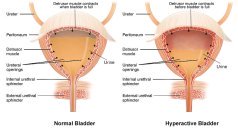Urinary incontinence (UI), or involuntary urination, is any leakage of urine or fecal matter. It can be a common and distressing problem, which may have a profound impact on quality of life. Urinary incontinence almost always results from an underlying treatable medical condition but is under-reported to medical practitioners. The most common types of urinary incontinence in women are stress urinary incontinence and urge urinary incontinence. Stress urinary incontinence is caused by loss of support of the urethra which is usually a consequence of damage to pelvic support structures as a result of childbirth. It is characterized by leaking of small amounts of urine with activities which increase abdominal pressure such as coughing, sneezing and lifting. Additionally, frequent exercise in high-impact activities can cause athletic incontinence to develop. Urge urinary incontinence is caused by uninhibited contractions of the detrusor muscle. It is characterized by leaking of large amounts of urine in association with insufficient warning to get to the bathroom in time.
Urinary Incontinence

